Democratic Leadership: A Charming Solution for Nursing's Crisis
VerifiedAdded on 2023/03/20
|8
|2479
|71
Report
AI Summary
This report, sourced from Desklib, examines the application of democratic leadership within the nursing profession as a response to the legitimacy crisis it currently faces. The report highlights the impact of events like the Mid Staffordshire Inquiry, which have eroded public trust and created a stressful work environment for nurses. It argues that adopting democratic systems of management can restore esteem and legitimacy. The analysis delves into the failures of current leadership practices, often characterized by rigid hierarchies and top-down management, leading to diminished staff morale and alienation. It proposes that nurse education should embrace humanistic psychologies and participatory methods, echoing the principles of Paulo Freire, to empower nurses. The report explores various approaches, including participatory action research and service user involvement, to democratize the labor process and incorporate diverse perspectives. It concludes by advocating for a new cadre of nurse leaders committed to democratic ideals, emphasizing the importance of listening, patience, and humility to foster empowered and emancipatory care, ultimately presenting a compelling case for democratic leadership as a charming solution.
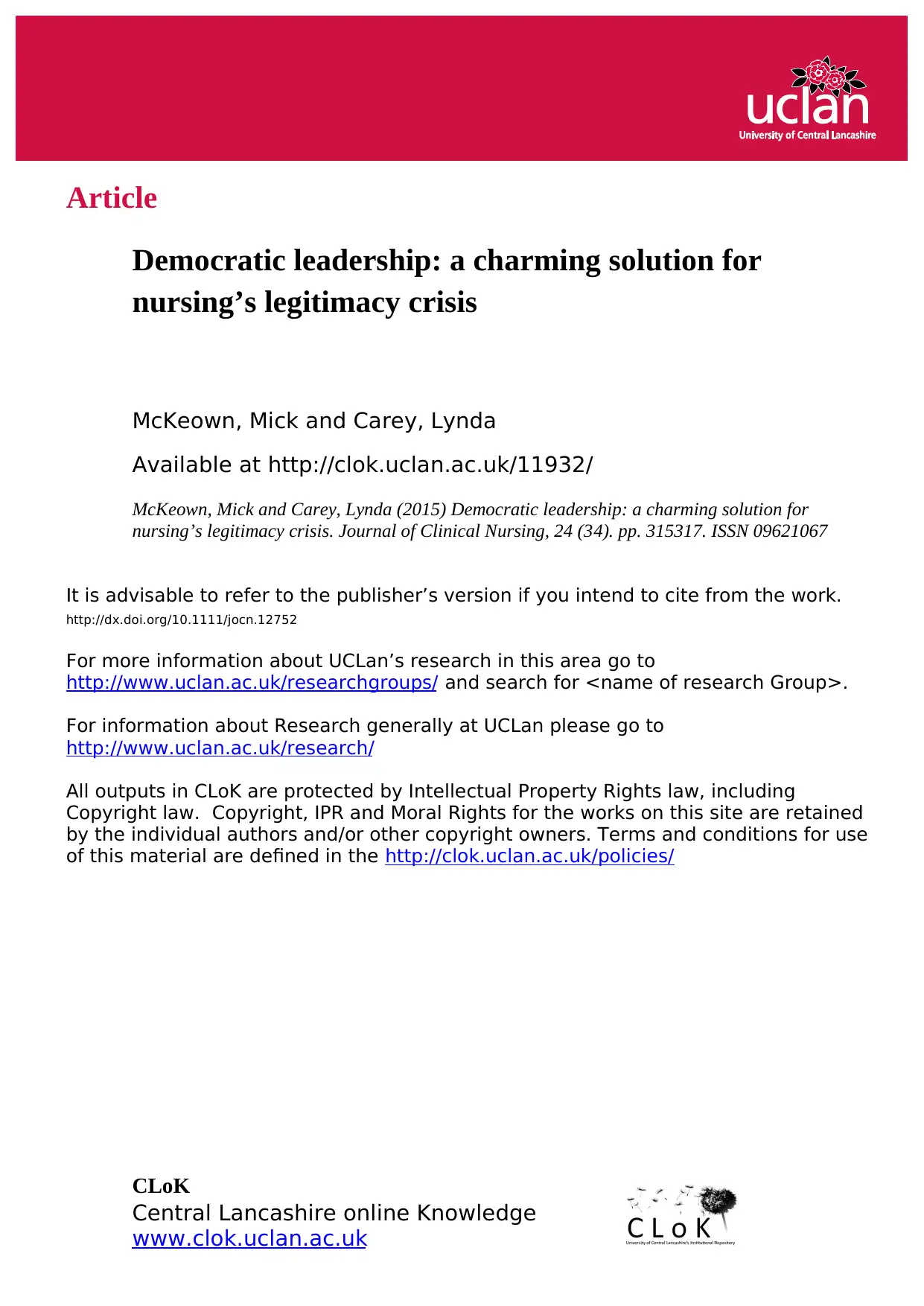
Article
Democratic leadership: a charming solution for
nursing’s legitimacy crisis
McKeown, Mick and Carey, Lynda
Available at http://clok.uclan.ac.uk/11932/
McKeown, Mick and Carey, Lynda (2015) Democratic leadership: a charming solution for
nursing’s legitimacy crisis. Journal of Clinical Nursing, 24 (3 4). pp. 315317. ISSN 09621067
It is advisable to refer to the publisher’s version if you intend to cite from the work.
http://dx.doi.org/10.1111/jocn.12752
For more information about UCLan’s research in this area go to
http://www.uclan.ac.uk/researchgroups/ and search for <name of research Group>.
For information about Research generally at UCLan please go to
http://www.uclan.ac.uk/research/
All outputs in CLoK are protected by Intellectual Property Rights law, including
Copyright law. Copyright, IPR and Moral Rights for the works on this site are retained
by the individual authors and/or other copyright owners. Terms and conditions for use
of this material are defined in the http://clok.uclan.ac.uk/policies/
CLoK
Central Lancashire online Knowledge
www.clok.uclan.ac.uk
Democratic leadership: a charming solution for
nursing’s legitimacy crisis
McKeown, Mick and Carey, Lynda
Available at http://clok.uclan.ac.uk/11932/
McKeown, Mick and Carey, Lynda (2015) Democratic leadership: a charming solution for
nursing’s legitimacy crisis. Journal of Clinical Nursing, 24 (3 4). pp. 315317. ISSN 09621067
It is advisable to refer to the publisher’s version if you intend to cite from the work.
http://dx.doi.org/10.1111/jocn.12752
For more information about UCLan’s research in this area go to
http://www.uclan.ac.uk/researchgroups/ and search for <name of research Group>.
For information about Research generally at UCLan please go to
http://www.uclan.ac.uk/research/
All outputs in CLoK are protected by Intellectual Property Rights law, including
Copyright law. Copyright, IPR and Moral Rights for the works on this site are retained
by the individual authors and/or other copyright owners. Terms and conditions for use
of this material are defined in the http://clok.uclan.ac.uk/policies/
CLoK
Central Lancashire online Knowledge
www.clok.uclan.ac.uk
Paraphrase This Document
Need a fresh take? Get an instant paraphrase of this document with our AI Paraphraser
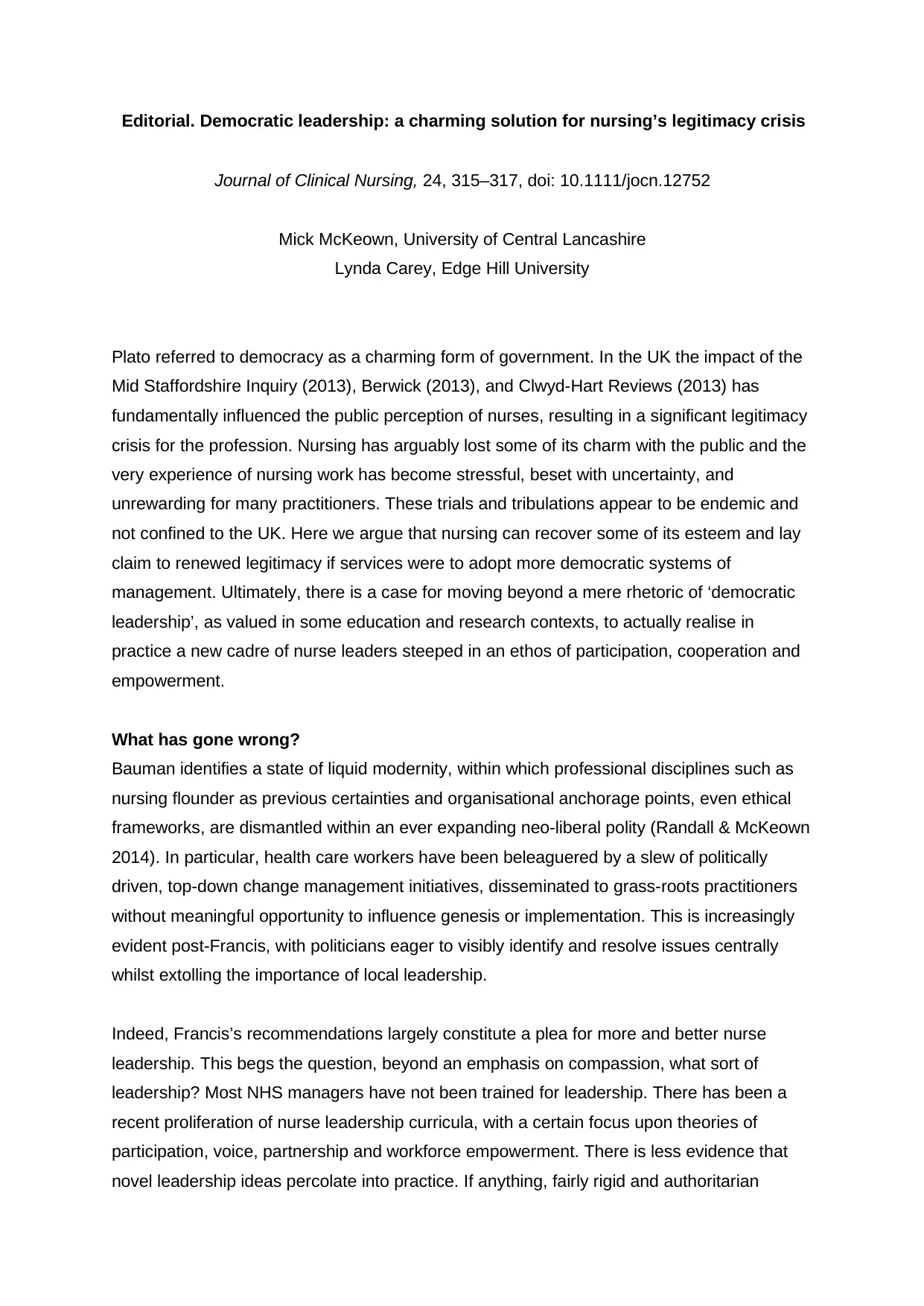
Editorial. Democratic leadership: a charming solution for nursing’s legitimacy crisis
Journal of Clinical Nursing, 24, 315–317, doi: 10.1111/jocn.12752
Mick McKeown, University of Central Lancashire
Lynda Carey, Edge Hill University
Plato referred to democracy as a charming form of government. In the UK the impact of the
Mid Staffordshire Inquiry (2013), Berwick (2013), and Clwyd-Hart Reviews (2013) has
fundamentally influenced the public perception of nurses, resulting in a significant legitimacy
crisis for the profession. Nursing has arguably lost some of its charm with the public and the
very experience of nursing work has become stressful, beset with uncertainty, and
unrewarding for many practitioners. These trials and tribulations appear to be endemic and
not confined to the UK. Here we argue that nursing can recover some of its esteem and lay
claim to renewed legitimacy if services were to adopt more democratic systems of
management. Ultimately, there is a case for moving beyond a mere rhetoric of ‘democratic
leadership’, as valued in some education and research contexts, to actually realise in
practice a new cadre of nurse leaders steeped in an ethos of participation, cooperation and
empowerment.
What has gone wrong?
Bauman identifies a state of liquid modernity, within which professional disciplines such as
nursing flounder as previous certainties and organisational anchorage points, even ethical
frameworks, are dismantled within an ever expanding neo-liberal polity (Randall & McKeown
2014). In particular, health care workers have been beleaguered by a slew of politically
driven, top-down change management initiatives, disseminated to grass-roots practitioners
without meaningful opportunity to influence genesis or implementation. This is increasingly
evident post-Francis, with politicians eager to visibly identify and resolve issues centrally
whilst extolling the importance of local leadership.
Indeed, Francis’s recommendations largely constitute a plea for more and better nurse
leadership. This begs the question, beyond an emphasis on compassion, what sort of
leadership? Most NHS managers have not been trained for leadership. There has been a
recent proliferation of nurse leadership curricula, with a certain focus upon theories of
participation, voice, partnership and workforce empowerment. There is less evidence that
novel leadership ideas percolate into practice. If anything, fairly rigid and authoritarian
Journal of Clinical Nursing, 24, 315–317, doi: 10.1111/jocn.12752
Mick McKeown, University of Central Lancashire
Lynda Carey, Edge Hill University
Plato referred to democracy as a charming form of government. In the UK the impact of the
Mid Staffordshire Inquiry (2013), Berwick (2013), and Clwyd-Hart Reviews (2013) has
fundamentally influenced the public perception of nurses, resulting in a significant legitimacy
crisis for the profession. Nursing has arguably lost some of its charm with the public and the
very experience of nursing work has become stressful, beset with uncertainty, and
unrewarding for many practitioners. These trials and tribulations appear to be endemic and
not confined to the UK. Here we argue that nursing can recover some of its esteem and lay
claim to renewed legitimacy if services were to adopt more democratic systems of
management. Ultimately, there is a case for moving beyond a mere rhetoric of ‘democratic
leadership’, as valued in some education and research contexts, to actually realise in
practice a new cadre of nurse leaders steeped in an ethos of participation, cooperation and
empowerment.
What has gone wrong?
Bauman identifies a state of liquid modernity, within which professional disciplines such as
nursing flounder as previous certainties and organisational anchorage points, even ethical
frameworks, are dismantled within an ever expanding neo-liberal polity (Randall & McKeown
2014). In particular, health care workers have been beleaguered by a slew of politically
driven, top-down change management initiatives, disseminated to grass-roots practitioners
without meaningful opportunity to influence genesis or implementation. This is increasingly
evident post-Francis, with politicians eager to visibly identify and resolve issues centrally
whilst extolling the importance of local leadership.
Indeed, Francis’s recommendations largely constitute a plea for more and better nurse
leadership. This begs the question, beyond an emphasis on compassion, what sort of
leadership? Most NHS managers have not been trained for leadership. There has been a
recent proliferation of nurse leadership curricula, with a certain focus upon theories of
participation, voice, partnership and workforce empowerment. There is less evidence that
novel leadership ideas percolate into practice. If anything, fairly rigid and authoritarian
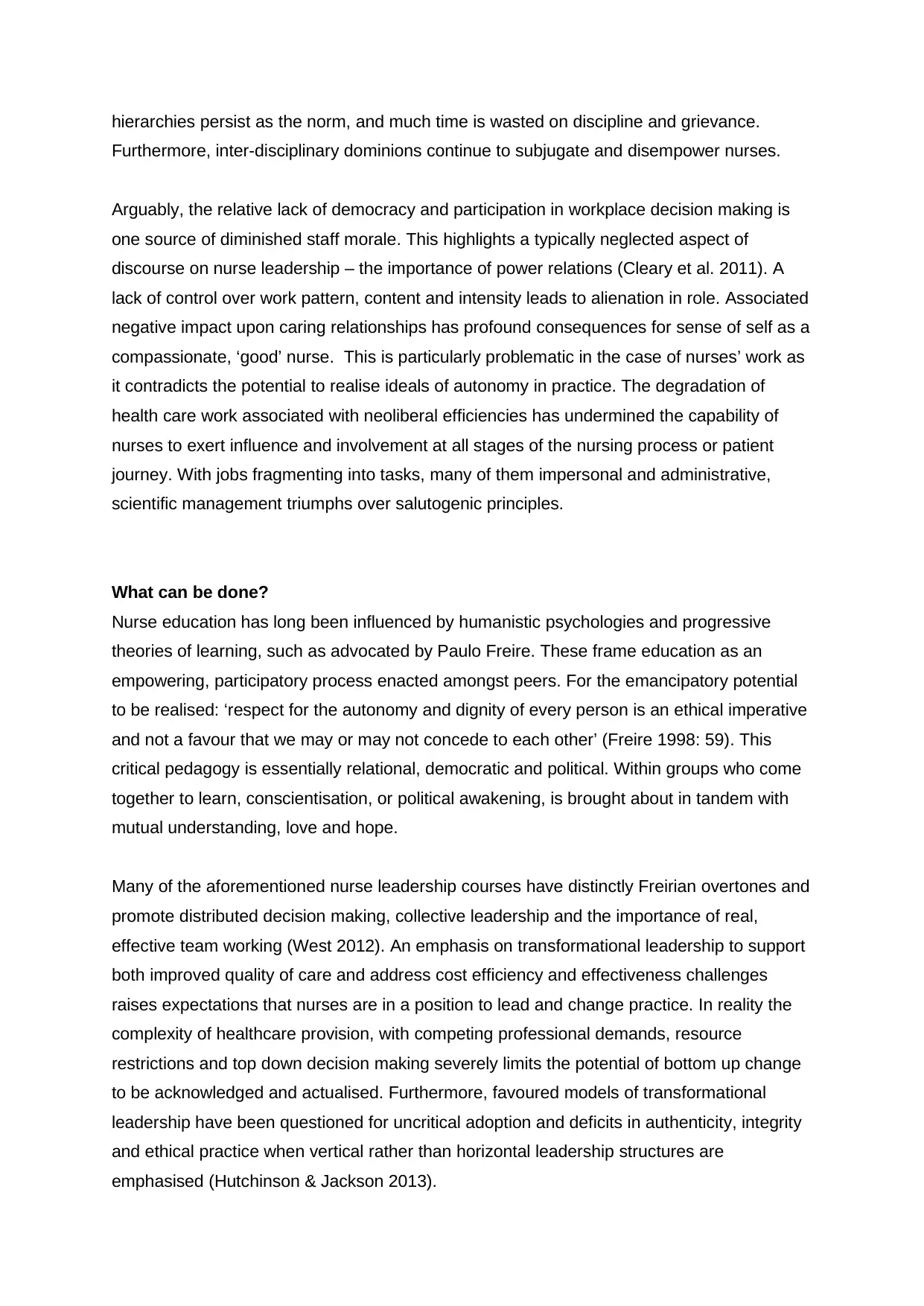
hierarchies persist as the norm, and much time is wasted on discipline and grievance.
Furthermore, inter-disciplinary dominions continue to subjugate and disempower nurses.
Arguably, the relative lack of democracy and participation in workplace decision making is
one source of diminished staff morale. This highlights a typically neglected aspect of
discourse on nurse leadership – the importance of power relations (Cleary et al. 2011). A
lack of control over work pattern, content and intensity leads to alienation in role. Associated
negative impact upon caring relationships has profound consequences for sense of self as a
compassionate, ‘good’ nurse. This is particularly problematic in the case of nurses’ work as
it contradicts the potential to realise ideals of autonomy in practice. The degradation of
health care work associated with neoliberal efficiencies has undermined the capability of
nurses to exert influence and involvement at all stages of the nursing process or patient
journey. With jobs fragmenting into tasks, many of them impersonal and administrative,
scientific management triumphs over salutogenic principles.
What can be done?
Nurse education has long been influenced by humanistic psychologies and progressive
theories of learning, such as advocated by Paulo Freire. These frame education as an
empowering, participatory process enacted amongst peers. For the emancipatory potential
to be realised: ‘respect for the autonomy and dignity of every person is an ethical imperative
and not a favour that we may or may not concede to each other’ (Freire 1998: 59). This
critical pedagogy is essentially relational, democratic and political. Within groups who come
together to learn, conscientisation, or political awakening, is brought about in tandem with
mutual understanding, love and hope.
Many of the aforementioned nurse leadership courses have distinctly Freirian overtones and
promote distributed decision making, collective leadership and the importance of real,
effective team working (West 2012). An emphasis on transformational leadership to support
both improved quality of care and address cost efficiency and effectiveness challenges
raises expectations that nurses are in a position to lead and change practice. In reality the
complexity of healthcare provision, with competing professional demands, resource
restrictions and top down decision making severely limits the potential of bottom up change
to be acknowledged and actualised. Furthermore, favoured models of transformational
leadership have been questioned for uncritical adoption and deficits in authenticity, integrity
and ethical practice when vertical rather than horizontal leadership structures are
emphasised (Hutchinson & Jackson 2013).
Furthermore, inter-disciplinary dominions continue to subjugate and disempower nurses.
Arguably, the relative lack of democracy and participation in workplace decision making is
one source of diminished staff morale. This highlights a typically neglected aspect of
discourse on nurse leadership – the importance of power relations (Cleary et al. 2011). A
lack of control over work pattern, content and intensity leads to alienation in role. Associated
negative impact upon caring relationships has profound consequences for sense of self as a
compassionate, ‘good’ nurse. This is particularly problematic in the case of nurses’ work as
it contradicts the potential to realise ideals of autonomy in practice. The degradation of
health care work associated with neoliberal efficiencies has undermined the capability of
nurses to exert influence and involvement at all stages of the nursing process or patient
journey. With jobs fragmenting into tasks, many of them impersonal and administrative,
scientific management triumphs over salutogenic principles.
What can be done?
Nurse education has long been influenced by humanistic psychologies and progressive
theories of learning, such as advocated by Paulo Freire. These frame education as an
empowering, participatory process enacted amongst peers. For the emancipatory potential
to be realised: ‘respect for the autonomy and dignity of every person is an ethical imperative
and not a favour that we may or may not concede to each other’ (Freire 1998: 59). This
critical pedagogy is essentially relational, democratic and political. Within groups who come
together to learn, conscientisation, or political awakening, is brought about in tandem with
mutual understanding, love and hope.
Many of the aforementioned nurse leadership courses have distinctly Freirian overtones and
promote distributed decision making, collective leadership and the importance of real,
effective team working (West 2012). An emphasis on transformational leadership to support
both improved quality of care and address cost efficiency and effectiveness challenges
raises expectations that nurses are in a position to lead and change practice. In reality the
complexity of healthcare provision, with competing professional demands, resource
restrictions and top down decision making severely limits the potential of bottom up change
to be acknowledged and actualised. Furthermore, favoured models of transformational
leadership have been questioned for uncritical adoption and deficits in authenticity, integrity
and ethical practice when vertical rather than horizontal leadership structures are
emphasised (Hutchinson & Jackson 2013).
⊘ This is a preview!⊘
Do you want full access?
Subscribe today to unlock all pages.

Trusted by 1+ million students worldwide
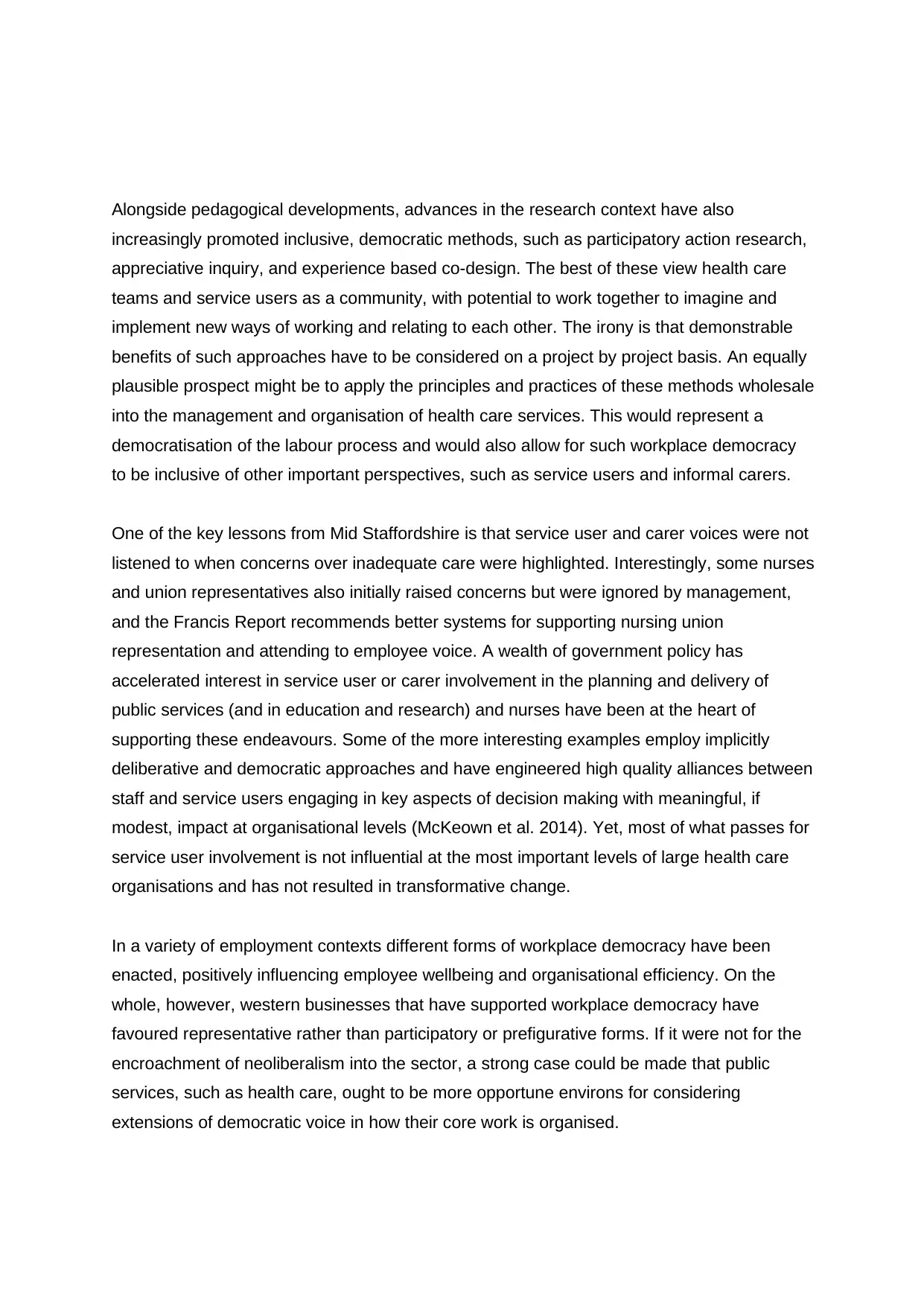
Alongside pedagogical developments, advances in the research context have also
increasingly promoted inclusive, democratic methods, such as participatory action research,
appreciative inquiry, and experience based co-design. The best of these view health care
teams and service users as a community, with potential to work together to imagine and
implement new ways of working and relating to each other. The irony is that demonstrable
benefits of such approaches have to be considered on a project by project basis. An equally
plausible prospect might be to apply the principles and practices of these methods wholesale
into the management and organisation of health care services. This would represent a
democratisation of the labour process and would also allow for such workplace democracy
to be inclusive of other important perspectives, such as service users and informal carers.
One of the key lessons from Mid Staffordshire is that service user and carer voices were not
listened to when concerns over inadequate care were highlighted. Interestingly, some nurses
and union representatives also initially raised concerns but were ignored by management,
and the Francis Report recommends better systems for supporting nursing union
representation and attending to employee voice. A wealth of government policy has
accelerated interest in service user or carer involvement in the planning and delivery of
public services (and in education and research) and nurses have been at the heart of
supporting these endeavours. Some of the more interesting examples employ implicitly
deliberative and democratic approaches and have engineered high quality alliances between
staff and service users engaging in key aspects of decision making with meaningful, if
modest, impact at organisational levels (McKeown et al. 2014). Yet, most of what passes for
service user involvement is not influential at the most important levels of large health care
organisations and has not resulted in transformative change.
In a variety of employment contexts different forms of workplace democracy have been
enacted, positively influencing employee wellbeing and organisational efficiency. On the
whole, however, western businesses that have supported workplace democracy have
favoured representative rather than participatory or prefigurative forms. If it were not for the
encroachment of neoliberalism into the sector, a strong case could be made that public
services, such as health care, ought to be more opportune environs for considering
extensions of democratic voice in how their core work is organised.
increasingly promoted inclusive, democratic methods, such as participatory action research,
appreciative inquiry, and experience based co-design. The best of these view health care
teams and service users as a community, with potential to work together to imagine and
implement new ways of working and relating to each other. The irony is that demonstrable
benefits of such approaches have to be considered on a project by project basis. An equally
plausible prospect might be to apply the principles and practices of these methods wholesale
into the management and organisation of health care services. This would represent a
democratisation of the labour process and would also allow for such workplace democracy
to be inclusive of other important perspectives, such as service users and informal carers.
One of the key lessons from Mid Staffordshire is that service user and carer voices were not
listened to when concerns over inadequate care were highlighted. Interestingly, some nurses
and union representatives also initially raised concerns but were ignored by management,
and the Francis Report recommends better systems for supporting nursing union
representation and attending to employee voice. A wealth of government policy has
accelerated interest in service user or carer involvement in the planning and delivery of
public services (and in education and research) and nurses have been at the heart of
supporting these endeavours. Some of the more interesting examples employ implicitly
deliberative and democratic approaches and have engineered high quality alliances between
staff and service users engaging in key aspects of decision making with meaningful, if
modest, impact at organisational levels (McKeown et al. 2014). Yet, most of what passes for
service user involvement is not influential at the most important levels of large health care
organisations and has not resulted in transformative change.
In a variety of employment contexts different forms of workplace democracy have been
enacted, positively influencing employee wellbeing and organisational efficiency. On the
whole, however, western businesses that have supported workplace democracy have
favoured representative rather than participatory or prefigurative forms. If it were not for the
encroachment of neoliberalism into the sector, a strong case could be made that public
services, such as health care, ought to be more opportune environs for considering
extensions of democratic voice in how their core work is organised.
Paraphrase This Document
Need a fresh take? Get an instant paraphrase of this document with our AI Paraphraser
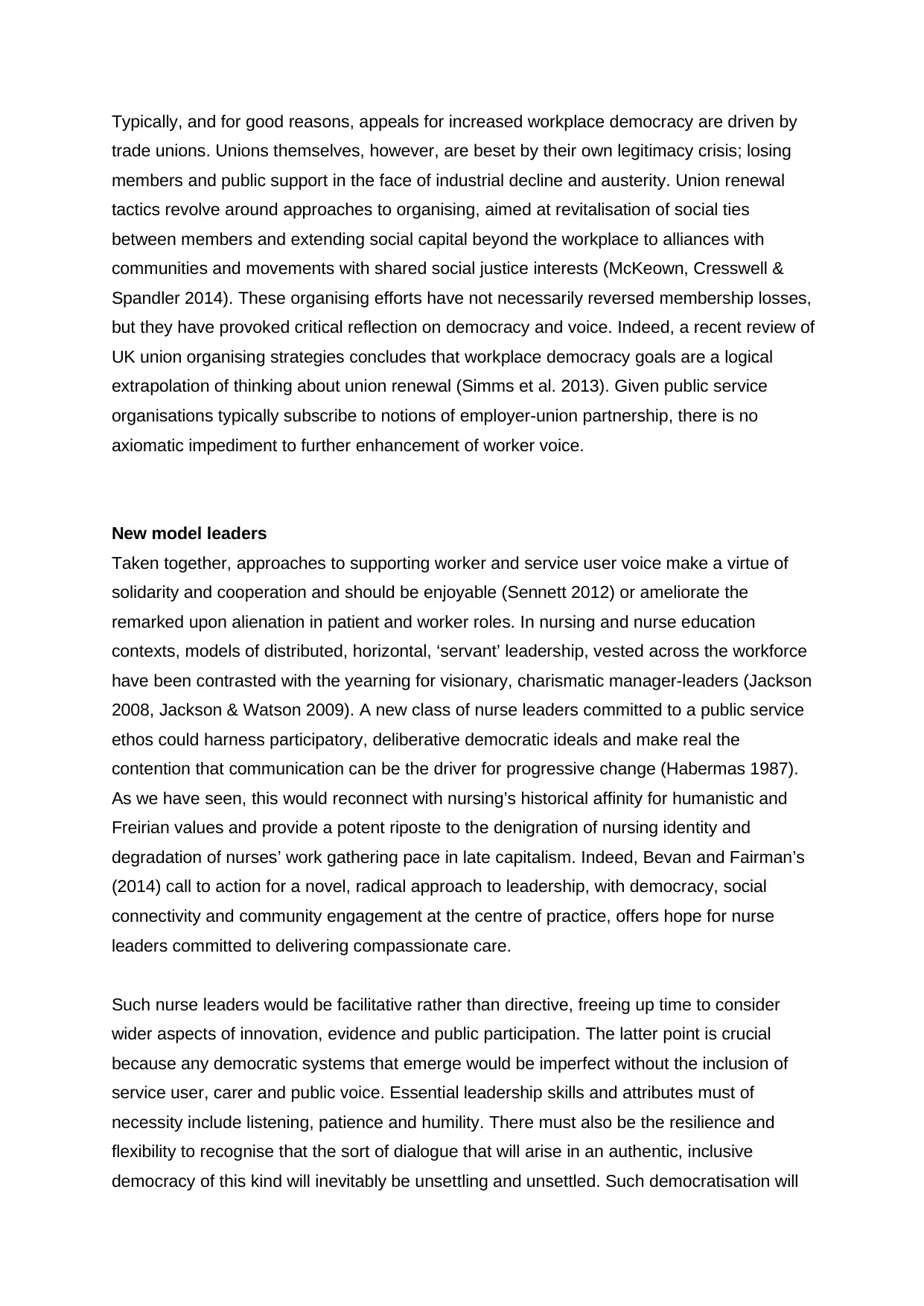
Typically, and for good reasons, appeals for increased workplace democracy are driven by
trade unions. Unions themselves, however, are beset by their own legitimacy crisis; losing
members and public support in the face of industrial decline and austerity. Union renewal
tactics revolve around approaches to organising, aimed at revitalisation of social ties
between members and extending social capital beyond the workplace to alliances with
communities and movements with shared social justice interests (McKeown, Cresswell &
Spandler 2014). These organising efforts have not necessarily reversed membership losses,
but they have provoked critical reflection on democracy and voice. Indeed, a recent review of
UK union organising strategies concludes that workplace democracy goals are a logical
extrapolation of thinking about union renewal (Simms et al. 2013). Given public service
organisations typically subscribe to notions of employer-union partnership, there is no
axiomatic impediment to further enhancement of worker voice.
New model leaders
Taken together, approaches to supporting worker and service user voice make a virtue of
solidarity and cooperation and should be enjoyable (Sennett 2012) or ameliorate the
remarked upon alienation in patient and worker roles. In nursing and nurse education
contexts, models of distributed, horizontal, ‘servant’ leadership, vested across the workforce
have been contrasted with the yearning for visionary, charismatic manager-leaders (Jackson
2008, Jackson & Watson 2009). A new class of nurse leaders committed to a public service
ethos could harness participatory, deliberative democratic ideals and make real the
contention that communication can be the driver for progressive change (Habermas 1987).
As we have seen, this would reconnect with nursing’s historical affinity for humanistic and
Freirian values and provide a potent riposte to the denigration of nursing identity and
degradation of nurses’ work gathering pace in late capitalism. Indeed, Bevan and Fairman’s
(2014) call to action for a novel, radical approach to leadership, with democracy, social
connectivity and community engagement at the centre of practice, offers hope for nurse
leaders committed to delivering compassionate care.
Such nurse leaders would be facilitative rather than directive, freeing up time to consider
wider aspects of innovation, evidence and public participation. The latter point is crucial
because any democratic systems that emerge would be imperfect without the inclusion of
service user, carer and public voice. Essential leadership skills and attributes must of
necessity include listening, patience and humility. There must also be the resilience and
flexibility to recognise that the sort of dialogue that will arise in an authentic, inclusive
democracy of this kind will inevitably be unsettling and unsettled. Such democratisation will
trade unions. Unions themselves, however, are beset by their own legitimacy crisis; losing
members and public support in the face of industrial decline and austerity. Union renewal
tactics revolve around approaches to organising, aimed at revitalisation of social ties
between members and extending social capital beyond the workplace to alliances with
communities and movements with shared social justice interests (McKeown, Cresswell &
Spandler 2014). These organising efforts have not necessarily reversed membership losses,
but they have provoked critical reflection on democracy and voice. Indeed, a recent review of
UK union organising strategies concludes that workplace democracy goals are a logical
extrapolation of thinking about union renewal (Simms et al. 2013). Given public service
organisations typically subscribe to notions of employer-union partnership, there is no
axiomatic impediment to further enhancement of worker voice.
New model leaders
Taken together, approaches to supporting worker and service user voice make a virtue of
solidarity and cooperation and should be enjoyable (Sennett 2012) or ameliorate the
remarked upon alienation in patient and worker roles. In nursing and nurse education
contexts, models of distributed, horizontal, ‘servant’ leadership, vested across the workforce
have been contrasted with the yearning for visionary, charismatic manager-leaders (Jackson
2008, Jackson & Watson 2009). A new class of nurse leaders committed to a public service
ethos could harness participatory, deliberative democratic ideals and make real the
contention that communication can be the driver for progressive change (Habermas 1987).
As we have seen, this would reconnect with nursing’s historical affinity for humanistic and
Freirian values and provide a potent riposte to the denigration of nursing identity and
degradation of nurses’ work gathering pace in late capitalism. Indeed, Bevan and Fairman’s
(2014) call to action for a novel, radical approach to leadership, with democracy, social
connectivity and community engagement at the centre of practice, offers hope for nurse
leaders committed to delivering compassionate care.
Such nurse leaders would be facilitative rather than directive, freeing up time to consider
wider aspects of innovation, evidence and public participation. The latter point is crucial
because any democratic systems that emerge would be imperfect without the inclusion of
service user, carer and public voice. Essential leadership skills and attributes must of
necessity include listening, patience and humility. There must also be the resilience and
flexibility to recognise that the sort of dialogue that will arise in an authentic, inclusive
democracy of this kind will inevitably be unsettling and unsettled. Such democratisation will
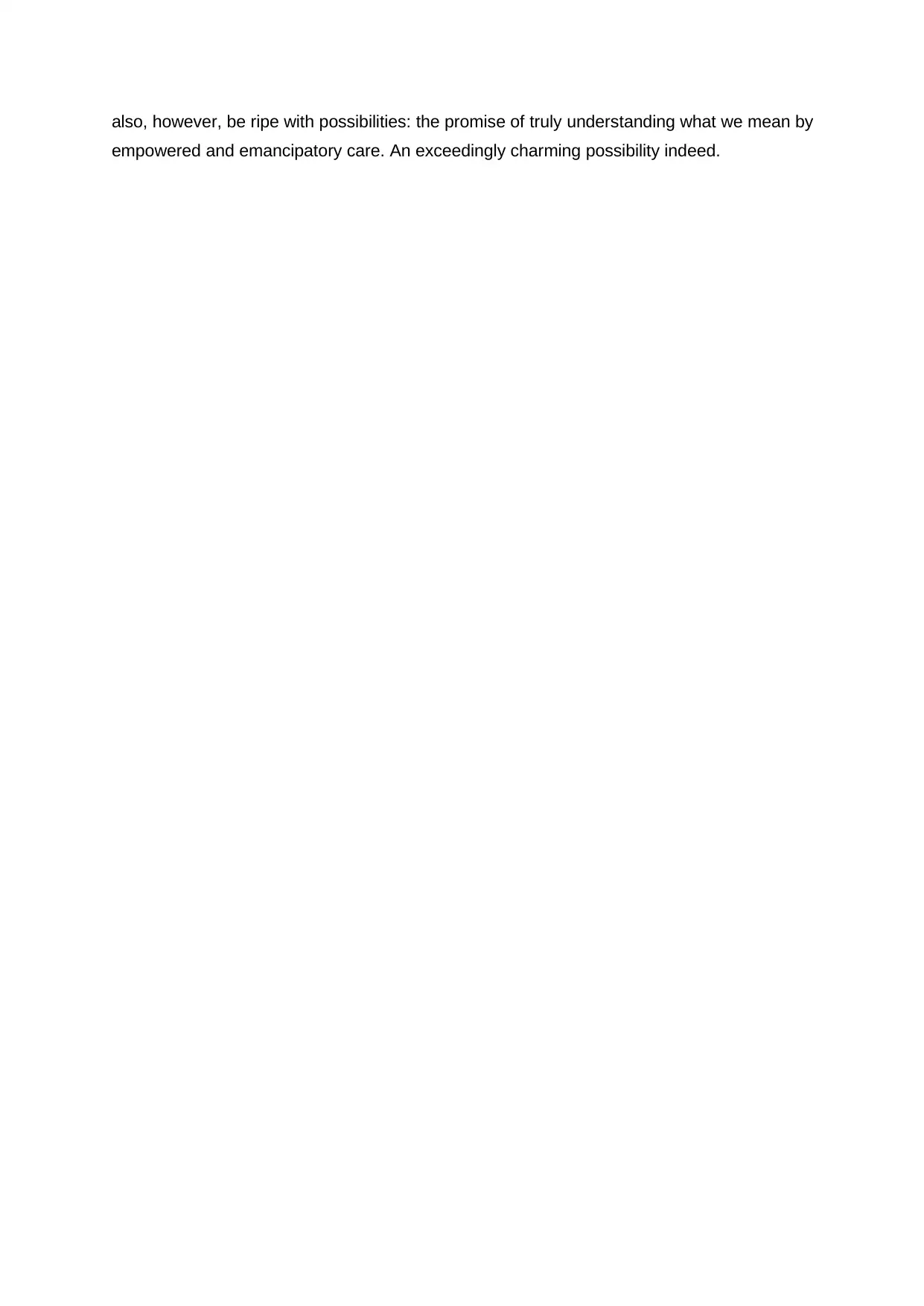
also, however, be ripe with possibilities: the promise of truly understanding what we mean by
empowered and emancipatory care. An exceedingly charming possibility indeed.
empowered and emancipatory care. An exceedingly charming possibility indeed.
⊘ This is a preview!⊘
Do you want full access?
Subscribe today to unlock all pages.

Trusted by 1+ million students worldwide
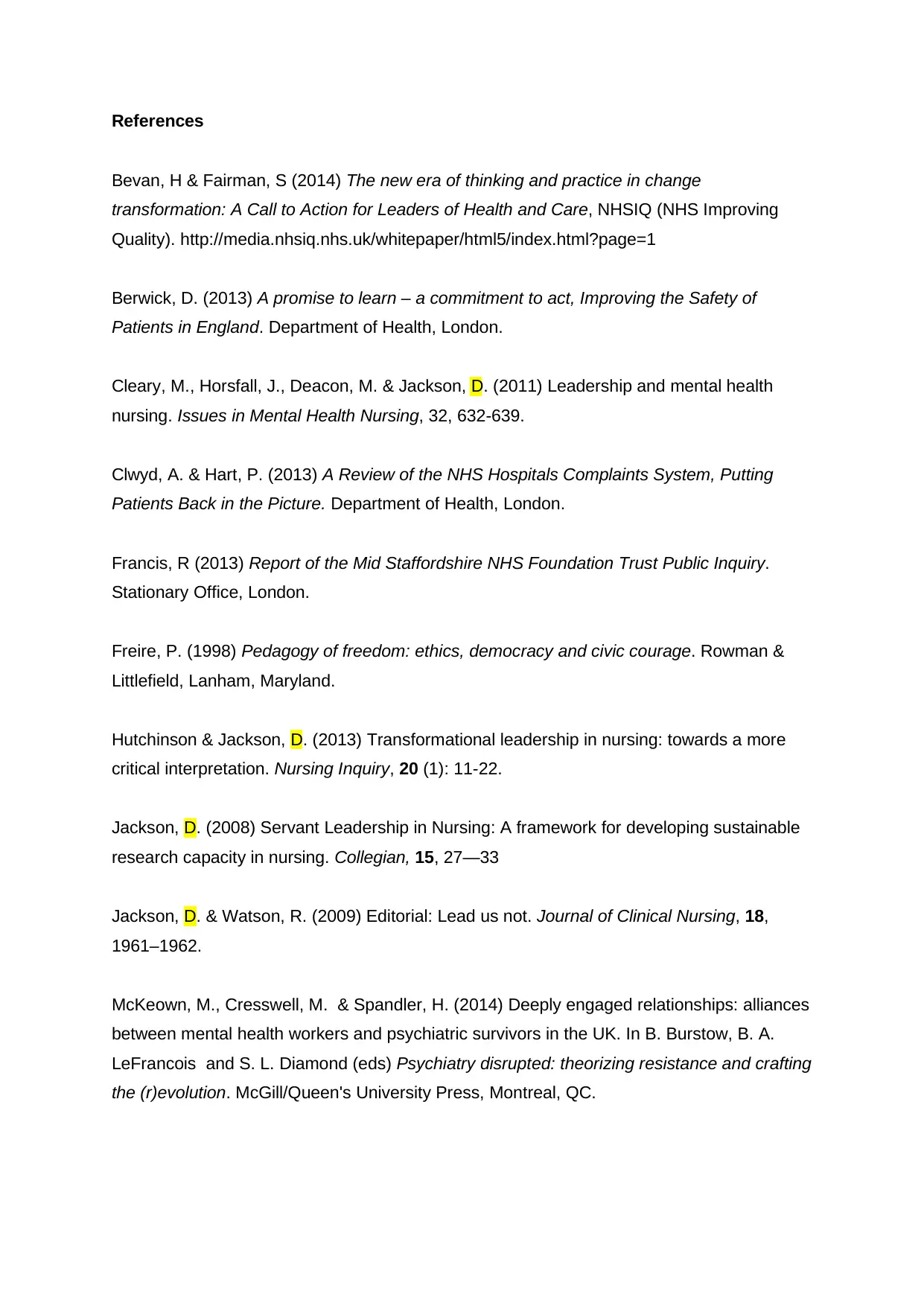
References
Bevan, H & Fairman, S (2014) The new era of thinking and practice in change
transformation: A Call to Action for Leaders of Health and Care, NHSIQ (NHS Improving
Quality). http://media.nhsiq.nhs.uk/whitepaper/html5/index.html?page=1
Berwick, D. (2013) A promise to learn – a commitment to act, Improving the Safety of
Patients in England. Department of Health, London.
Cleary, M., Horsfall, J., Deacon, M. & Jackson, D. (2011) Leadership and mental health
nursing. Issues in Mental Health Nursing, 32, 632-639.
Clwyd, A. & Hart, P. (2013) A Review of the NHS Hospitals Complaints System, Putting
Patients Back in the Picture. Department of Health, London.
Francis, R (2013) Report of the Mid Staffordshire NHS Foundation Trust Public Inquiry.
Stationary Office, London.
Freire, P. (1998) Pedagogy of freedom: ethics, democracy and civic courage. Rowman &
Littlefield, Lanham, Maryland.
Hutchinson & Jackson, D. (2013) Transformational leadership in nursing: towards a more
critical interpretation. Nursing Inquiry, 20 (1): 11-22.
Jackson, D. (2008) Servant Leadership in Nursing: A framework for developing sustainable
research capacity in nursing. Collegian, 15, 27—33
Jackson, D. & Watson, R. (2009) Editorial: Lead us not. Journal of Clinical Nursing, 18,
1961–1962.
McKeown, M., Cresswell, M. & Spandler, H. (2014) Deeply engaged relationships: alliances
between mental health workers and psychiatric survivors in the UK. In B. Burstow, B. A.
LeFrancois and S. L. Diamond (eds) Psychiatry disrupted: theorizing resistance and crafting
the (r)evolution. McGill/Queen's University Press, Montreal, QC.
Bevan, H & Fairman, S (2014) The new era of thinking and practice in change
transformation: A Call to Action for Leaders of Health and Care, NHSIQ (NHS Improving
Quality). http://media.nhsiq.nhs.uk/whitepaper/html5/index.html?page=1
Berwick, D. (2013) A promise to learn – a commitment to act, Improving the Safety of
Patients in England. Department of Health, London.
Cleary, M., Horsfall, J., Deacon, M. & Jackson, D. (2011) Leadership and mental health
nursing. Issues in Mental Health Nursing, 32, 632-639.
Clwyd, A. & Hart, P. (2013) A Review of the NHS Hospitals Complaints System, Putting
Patients Back in the Picture. Department of Health, London.
Francis, R (2013) Report of the Mid Staffordshire NHS Foundation Trust Public Inquiry.
Stationary Office, London.
Freire, P. (1998) Pedagogy of freedom: ethics, democracy and civic courage. Rowman &
Littlefield, Lanham, Maryland.
Hutchinson & Jackson, D. (2013) Transformational leadership in nursing: towards a more
critical interpretation. Nursing Inquiry, 20 (1): 11-22.
Jackson, D. (2008) Servant Leadership in Nursing: A framework for developing sustainable
research capacity in nursing. Collegian, 15, 27—33
Jackson, D. & Watson, R. (2009) Editorial: Lead us not. Journal of Clinical Nursing, 18,
1961–1962.
McKeown, M., Cresswell, M. & Spandler, H. (2014) Deeply engaged relationships: alliances
between mental health workers and psychiatric survivors in the UK. In B. Burstow, B. A.
LeFrancois and S. L. Diamond (eds) Psychiatry disrupted: theorizing resistance and crafting
the (r)evolution. McGill/Queen's University Press, Montreal, QC.
Paraphrase This Document
Need a fresh take? Get an instant paraphrase of this document with our AI Paraphraser
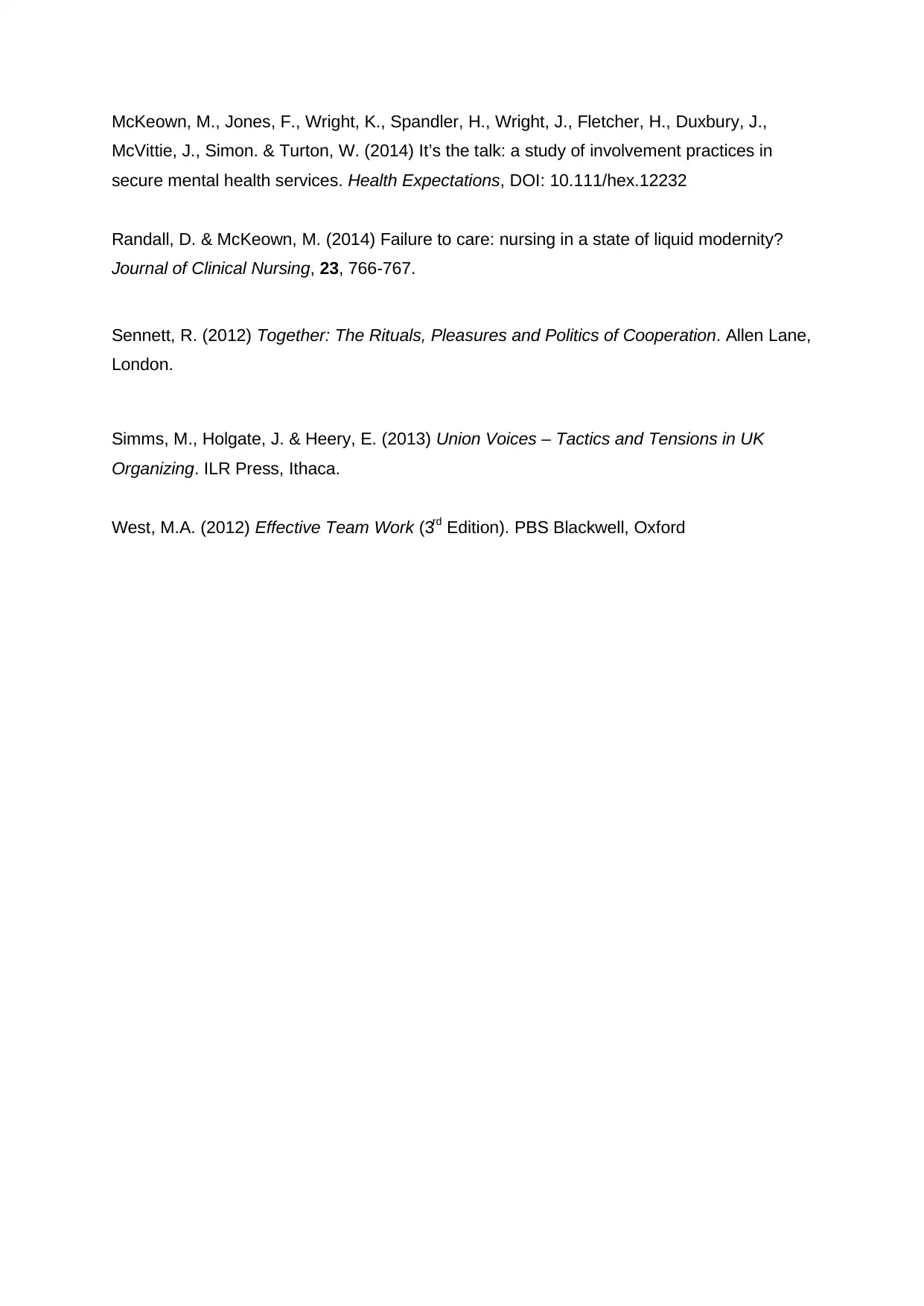
McKeown, M., Jones, F., Wright, K., Spandler, H., Wright, J., Fletcher, H., Duxbury, J.,
McVittie, J., Simon. & Turton, W. (2014) It’s the talk: a study of involvement practices in
secure mental health services. Health Expectations, DOI: 10.111/hex.12232
Randall, D. & McKeown, M. (2014) Failure to care: nursing in a state of liquid modernity?
Journal of Clinical Nursing, 23, 766-767.
Sennett, R. (2012) Together: The Rituals, Pleasures and Politics of Cooperation. Allen Lane,
London.
Simms, M., Holgate, J. & Heery, E. (2013) Union Voices – Tactics and Tensions in UK
Organizing. ILR Press, Ithaca.
West, M.A. (2012) Effective Team Work (3rd Edition). PBS Blackwell, Oxford
McVittie, J., Simon. & Turton, W. (2014) It’s the talk: a study of involvement practices in
secure mental health services. Health Expectations, DOI: 10.111/hex.12232
Randall, D. & McKeown, M. (2014) Failure to care: nursing in a state of liquid modernity?
Journal of Clinical Nursing, 23, 766-767.
Sennett, R. (2012) Together: The Rituals, Pleasures and Politics of Cooperation. Allen Lane,
London.
Simms, M., Holgate, J. & Heery, E. (2013) Union Voices – Tactics and Tensions in UK
Organizing. ILR Press, Ithaca.
West, M.A. (2012) Effective Team Work (3rd Edition). PBS Blackwell, Oxford
1 out of 8
Your All-in-One AI-Powered Toolkit for Academic Success.
+13062052269
info@desklib.com
Available 24*7 on WhatsApp / Email
![[object Object]](/_next/static/media/star-bottom.7253800d.svg)
Unlock your academic potential
Copyright © 2020–2026 A2Z Services. All Rights Reserved. Developed and managed by ZUCOL.
